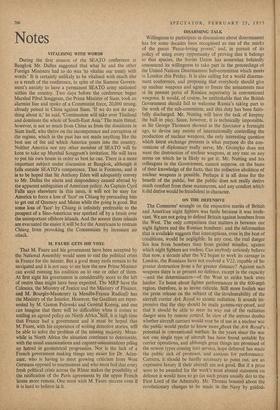DISARMING TALK
Willingness to participate in discussions about disarmament has for some decades been recognised as one of the marks of the genus 'Peace-loving power,' and, in pursuit of its policy of using every opportunity of proving that it belongs to that species, the Soviet Union has somewhat belatedly announced its willingness to take part in the proceedings of the United Nations Disarmament Sub-committee which meets in London this Friday. It is also calling for a world disarma- ment conference, and proposing that everybody should give up nuclear weapons and agree to freeze the armaments race at its 'present point of Russian superiority in conventional weapons. It would, of course, be unthinkable that the British Government should fail to welcome Russia's taking part in the work of the stib-committee, and this duty has been faith- fully discharged. Mr. Nutting will have the task of keeping the ball in play. Since, however, it is technically impossible, as Sir George Thomson showed in the Spectator a fortnight ago, to devise any means of internationally controlling the production of nuclear weapons, the only interesting question which latest exchange presents is what purpose do the con- ventions of diplomacy really serve; Mr. Gromyko does not want the destruction of nuclear weapons, at any rate on any terms on which he is likely to get it; Mr. Nutting and his colleagues in the Government, cannot suppose, on the basis- of their knowledge of the facts, that the collective abolition of nuclear weapons is possible. Perhaps it is all done for the benefit of the public, but the public does not really derive much comfort from these manoeuvres, and any comfort which it did derive would be fraudulent in character.










































 Previous page
Previous page